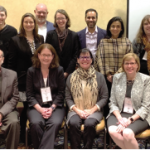 Rheumatologists are natural teachers. As a group we are drawn to the mystery of making a diagnosis and enjoy passing on our fascinating and alluring detective game to students. Some of us extend our expertise to become clinical investigators or bench scientists, and others devote ourselves to the education of trainees and education scholarship. Similar knowledge, skill sets, experience and training are needed for an individual to advance an equivalent career as a “card-carrying” clinician-scholar-educator (CSE).
Rheumatologists are natural teachers. As a group we are drawn to the mystery of making a diagnosis and enjoy passing on our fascinating and alluring detective game to students. Some of us extend our expertise to become clinical investigators or bench scientists, and others devote ourselves to the education of trainees and education scholarship. Similar knowledge, skill sets, experience and training are needed for an individual to advance an equivalent career as a “card-carrying” clinician-scholar-educator (CSE).
As educators, we are increasingly called upon to ensure the training of young physicians is of the highest quality and to perform scholarly work developing, assessing and disseminating innovative education methodology. To promote individuals who desire this career pathway, mentorship and resources are needed. Although this group of individuals is being increasingly recognized by some institutions through the creation of a separate CSE promotion track, support for individuals who want to devote their careers to this endeavor has still not been fully realized.
Support Is Essential
Educators express the work they do appears to be less valued and recognized than their clinical duties and their identity as an educator is less well defined.1 To strengthen the mission of the CSE, the creation of a community of medical educators is essential at both institutional and national levels; both are important at different phases of the CSE career.
Institutional support for medical educators and education researchers is often far less than that afforded to colleagues in basic, clinical and translational research. Local support not only furthers the educator’s career, but also greatly benefits the institution by ensuring programs for trainees are of the highest quality.
The role of professional medical education societies in fostering professional identity has also been described.2 Recognition of individuals on a national level furthers career advancement and promotion at the home institution. Such recognition may further serve to create a global network of individuals with a shared commitment to medical education who can collaborate on research and serve as content experts for specialty societies. These networks can be conceptualized as communities of practice that can support CSE identity formation.3
CSE Awards
Rheumatologists are on the cutting edge of CSE support, recognizing that the investment in education scholarship creates a workforce of talented individuals who help attract residents to rheumatology and infuse the ACR with high-quality, innovative programs for its members and trainees.
The purpose of the Rheumatology Research Foundation CSE Awards is to develop and support educational scholars in the field of rheumatology. Through this award, recipients foster their academic careers in medical education while working on a scholarly project to enhance teaching and learning in rheumatology. The award was originally conceptualized as bringing recognition and support to the educator on a level equal to that of bench and translational research.
To ensure programs are infused with the best faculty educators, support at the institutional & national level is needed.
The first three Foundation CSE Awards were granted in July 1999. Since then, between two and three educators have been granted the award yearly. Many projects have resulted in enduring materials that are used nationally, such as Rheum2Learn, Rheum4Science, USSONAR and the Hospital for Special Surgery’s Critical Literature Assessment Skills Support—Rheumatology (HSS CLASS-Rheum).
One unexpected benefit of the CSE program has been the organic development of a community of educational scholars, who meet throughout the year and collaborate to support each other. These scholars play a role in activities that benefit the ACR and the rheumatology community, such as advocacy and updating the Milestones. The group continues to collaborate on research and teaching programs disseminated for use at local and national levels.
The Academy: Grant Programs to Support Educators’ Contributions
Academies have arisen to support educators and are varied in their missions and the amount of individual support granted. A 2008 survey sent to U.S. medical schools found less than 50% offer any monetary awards to scholars and only 8% offer protected time for research.4 Many have a long funding history and have shown outcomes that include not just innovative programs but career advancement for the CSE as well.
Conceptualizing a similar model at an institutional level, the HSS Academy of Rheumatology Medical Educators was founded in 2011 to support educators and ensure a home where their accomplishments would receive the same recognition as colleagues doing bench, clinical and translational research.
The HSS Academy’s pilot grant innovations funding program was designed “to serve as an impetus for the development of new teaching programs and to promote curricular change through the development of new or improved teaching programs and learning opportunities.”5
The program is unique in that nearly a million dollars was raised through directed fundraising by the academy director and designated specifically for annually awarded education grants. Grants were intended as an impetus to educators throughout the hospital to help improve educational programs broadly, not just to support those committed to educational research. Each grant application was assessed by nationally recognized educators, many of them previous Foundation CSE awardees with significant ongoing contributions to rheumatology education. Scores were assigned to each grant using Glassick’s criteria for education research. Applications that scored the highest were awarded up to $50,000 for one year. Those grants that demonstrated ongoing productivity were eligible for additional support.
Our survey of recipients of the initial pilot grant funding program found many noted benefits to their careers following the grant including increased recognition as an educator, time protected to pursue education research activities, teaching awards and subsequent promotions or other grants awarded. The number continuing to devote time to education research after completing their award was an impressive 70%.
Thereafter, the Academy made a commitment to continue supporting a core group of educators cultivated during the initial phase with a research assistant that allowed for continued productivity. This led to the creation of a core group of institutional educators who continue to produce high quality scholarship and innovative program development.
The formation of the education research funding pilot highlights the talents of previously unsupported and unrecognized teaching faculty by allowing them to distinguish themselves at home professionally and academically. This underscores the clear advantages of an institutional structure to foster the CSE professional identity and simultaneously achieve the hospital’s heightened educational goals.
Conclusions
To ensure programs are infused with the best faculty educators, support at the institutional and national level is needed. This includes such support as CSE promotion tracks, career development grants and research time. Academies may fill one void by creating an organizational structure at the home institution that promotes professional identity, legitimizes the goals of the CSE and supports those interested in education research.
Programs at the national level, such as the Foundation CSE award, set our professional society apart as granting monetary support and research time to individuals desiring a career as an educator. Such career development awards bring recognition to the individual’s work as being worthy of support and help to ensure ongoing professional success. On a broader level, career development awards serve to bring together a community of educators, allowing for continued professional growth, mentorship, sponsorship and collaboration, advancing the educational mission of such national professional societies as the ACR.
Jessica R. Berman, MD, is associate professor of medicine (education), director of the Rheumatology Fellowship Program and associate director of the HSS Academy, Department of Internal Medicine, Hospital for Special Surgery and Weill Cornell Medicine, New York City.
Juliet Aizer, MD, MPH, is an assistant professor of clinical medicine, associate director of the Rheumatology Fellowship Program, unit leader of patient care and physicianship, and Nanette Laitman Education Scholar in Entrepreneurship at the Hospital for Special Surgery and Weill Cornell Medicine.
Stephen A. Paget, MD, is physician-in-chief emeritus of the Hospital for Special Surgery, founder and director of the Academy of Medical Educators and professor of medicine in the Department of Internal Medicine at the Hospital for Special Surgery and Weill Cornell Medicine.
References
- Sabel E, Archer J. Early Careers Working Group at the Academy of Medical Educators. ‘Medical education is the ugly duckling of the medical world’ and other challenges to medical educators’ identity construction: A qualitative study. Acad Med. 2014 Nov;89(11):1474–1480.
- Heitz JW. The role of professional medical education societies in fostering professional identity. Acad Med. 2015 Aug;90(8):1002–1003.
- Cruess RL, Cruess SR, Steinert Y. Medicine as a community of practice: Implications for medical education. Acad Med. 2018 Feb;93(2):185–191.
- Searle NS, Thompson BM, Friedland JA, et al. The prevalence and practice of academies of medical educators: A survey of U.S. medical schools. Acad Med. 2010 Jan;85(1):48–56.
- Berman JR, Aizer J, Tiongson MD, et al. The value of supporting education research in the academic environment: Hospital for Special Surgery Academy of Rheumatology Medical Educators. Acad Med. 2020 Dec 8. Epub ahead of print.


